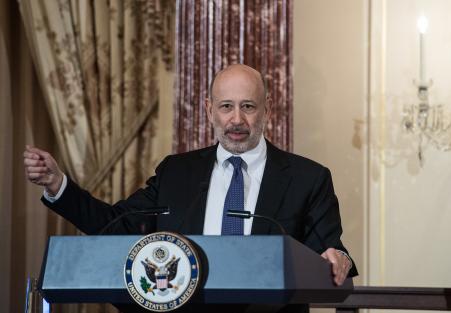By Amy Nordrum -

When chief executives are stricken with severe or life-threatening diseases, are they obligated to share details about their personal health with their company and its shareholders? Goldman Sachs (NYSE:GS) CEO and Chairman Lloyd Blankfein told investors Tuesday that he has lymphoma, a common form of blood cancer. Blankfein’s announcement came just a day after he learned of his diagnosis and illustrates a shift in the debate over whether the details of a CEO's illness and treatment are inherently private or public.
“I think it’s very important that you have a timely and transparent disclosure when something like this happens,” Anthea Zhang, a strategic management expert at Rice University, said. “For ordinary people, a health issue is private information. But for some person who is CEO of a large public company, it's not only his or her private issue; it's also related to shareholder wealth.”
Blankfein’s announcement is in line with those of several other high-profile business leaders who have recently chosen to disclose life-threatening illnesses. James Dimon, chairman and CEO of JPMorgan Chase (NYSE:JPM) and Co., openly discussed his battle with throat cancer over the past year while continuing to fulfill his duties at the bank. Since 2012, Warren Buffet, founder of Berkshire Hathaway Inc . (NYSE:BRKa), has been upfront with investors as he has fought prostate cancer.
In every case, a company must consider the delicate balance between protecting private health information and sharing knowledge that is pertinent to its own well-being.
"You want to be respectful for the person who has this affliction, but at the same time, it's information that's relevant not only to the board of directors but also to shareholders," David Larcker, a specialist in corporate governance at Stanford University, said. "It's a very tough trade-off to make. That's just the nature of business -- there are no bright-line rules around this."
What was once a personal decision has morphed into a question of corporate responsibility, and even liability. A publicly traded company is required by law to disclose information that can “materially” impact an investors’ decision to buy or sell its stock. Increasingly, companies have decided to act as though the fact that a CEO is experiencing a serious health condition falls within that definition.
“In many court cases, the health of the CEO has actually been considered a material issue that needs to be brought to investors’ attention,” Rita McGrath, a strategic management consultant, said. “You don't always have a choice.” In fact, McGrath said she can no longer imagine a scenario in which a CEO who was seriously ill could withhold that information from shareholders or the company’s board.
David Lewin, a retired professor who specializes in leadership and management issues at the University of California Los Angeles, says trying to keep such information secret likely would be a losing battle in the age of the Internet, where the lives of everyone from celebrities to prominent business executives are more open and accessible than ever.
"A prudent company would, I think, recognize the likelihood of such a fact becoming known," he said. "If it recognizes that, it might well take steps to make it known so that at least, it's the one making it known rather than having it surface in some other way."
In a departure from that trend, Apple Inc (NASDAQ:AAPL). co-founder Steve Jobs waited a year after his diagnosis to tell employees and investors that he had pancreatic cancer. He would later call concerns about his personal health “a distraction” to employees even as he prepared to take a medical leave of absence from the company. Jobs died in 2011.
"Different companies handle it in different ways," Larcker said. "Some are very quick and very transparent about this, and I think that gives shareholders a lot of trust, saying the board's on top of this, and should there be a succession event, they've got a plan in place."
Blankfein said in a note that his form of lymphoma is “highly curable” and that he will seek treatment in the coming months. He said he expects to be cured and will continue to lead the company “as normal” while undergoing treatment, though he did cancel a few trips that had been planned during that time.
Experts said Goldman is prepared to handle the inevitable unknowns that arise as its CEO pursues cancer treatment.
“I think there's a lot of trust in the depth of Goldman's bench,” McGrath said. "Rather than people finding out, I think they're better off being very upfront about it.”
Lymphoma is a type of blood cancer that is divided into non-Hodgkin lymphoma and Hodgkin lymphoma. Blankfein did not specify which kind of lymphoma he has, but Hodgkin lymphoma in particular is considered highly treatable. Still, Goldman’s stock wavered soon after Blankfein’s announcement, dropping by about 2.7 percent in midday trading.
Lewin said should it become necessary, the firm has a long history of managing smooth and successful transitions.
“I think one can say that with Goldman, they're prepared for Blankfein coming back and accepting this diagnosis and things being as they were, and I think they’re prepared for the opposite, as well,” Lewin says.
Zhang said there is one thing that Goldman could do differently to better prepare itself in its management strategy: split the role of CEO and chairman of the board between two people instead of allowing one person such as Blankfein to occupy both. The division could help protect a company against an interruption in or sudden loss of leadership.
“From a risk management perspective, it's really important to divide those key positions between two different persons,” Zhang said.
